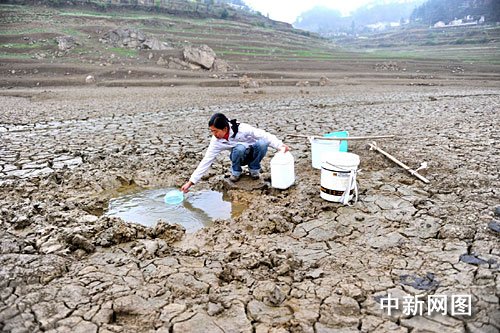Simple solution?
The central government pledged in its No.1 document – a summary of the government's priorities issued at the beginning of the year – that it will put 4 trillion yuan ($612 billion) into developing water conservancy during the next 10 years.
In the document, the government urged local authorities to set aside 10 percent of their revenue accrued from land sales for farmland water conservation projects.
Senior officials estimated that up to 90 billion yuan from the proceeds of land sales could be invested in farmland water conservation projects this year.
Guizhou, one of the worst-hit provinces during last year's catastrophic drought that ravaged Southwest China, decided to use 12 percent of its profits from land sales for rural water conservancy, said Li Ping, director of the provincial water bureau.
Based on last year's land sales, the province will spend 600 to 700 million yuan on farmland water conservancy this year.
Despite the massive investment, the provincial government would like to see even more money spent on the effort and has given the go-ahead to a water investment company to carry out fundraising, Li said.
The provincial water bureau is expected to find 30 billion yuan that it will sink into the company as capital stock during the next five years, and one-fifth of that investment will soon be injected into the company for initial capital, Lu Hongwei, deputy director of the bureau, confirmed.
This year, investment in Guizhou's water sector from the government's budget will reach a record 15 billion yuan, up 50 percent year-on-year, Li said.
Despite efforts and investment, the reservoirs have not been working efficiently to keep residents – especially those who live in small villages – clear of water shortages.
As the water pressure increases, the corrosion in karst landforms will also increase, which leads to water leakage through the cracks in the hills, Su explained to China Youth Daily.
There were 106 million people living in Guizhou struggling to get access to clean water by 2011, according to a report issued by the provincial government.
"The government's heavy investment in the past five years only brought clean water to about 2 million people," Su said. "Building big reservoirs is not the best solution."
An experiment
Su and his colleagues started an experiment by building small water cellars at Labayan, a small village located in one of Guizhou's karst areas with less than 60 inhabitants, in 2005.
The villagers signed a contract with the research center, agreeing to build water cellars at the backs of their houses which would be used for storing water, either steam-leaked from cracks in the hills or rainwater.
Surprisingly, researchers found that more than 90 percent of the cellars were full of water, and even helped villagers to survive the drought last year.
The water cellar project turned out to be a success, which gave Su confidence to build more small-scale county-level projects – a true grassroots solution to the problem.
But for local officials, things are not so scientific.
A former township head told China Youth Daily that building a medium-to-large reservoir is preferable for local authorities, because it would make their "political achievements" more conspicuous to higher authorities.
"Building some water cellar in the backyard of a villager's house isn't a good way for officials to show their efforts," he said.
The central government has invested 7.3 billion yuan to back up the Qianzhong Water Control Project, which is expected to store at least 1 billion cubic meters of water, meaning it will be able to supply water for more than 3.6 million people and irrigate 106,000 hectares of farmland in central Guizhou.
Small projects should be subsidized by the government at all levels as well, Su suggested.
"Scientific achievements will ensure that the investment is not wasted."


















